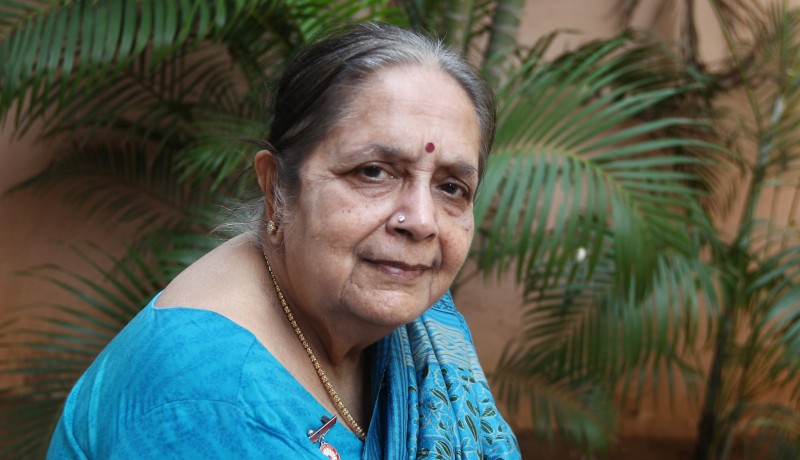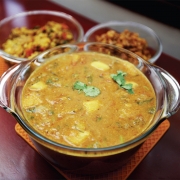
Columns

A series by Pratibha Jain about silvers who believe nurturing the body and mind is the key to joy.
Featuring Leela Krishnan from Chennai
There is easy grace and contentment when she cooks. A certain calm.
She placed the pan on the stove and added the oil. Without waiting for it to heat up, she added the mustard seeds. She immediately covered the pan with a lid. When she heard the spluttering of the mustard, she removed the lid and added the urad dal. Then she closed the lid again. After a few seconds, she added the curry leaves, red chillies and later the asafoetida.
Whatever the order of the ingredients for the different recipes, she uses the lid in this manner while tempering (baghaar). For me, it was the defining feature of her cooking. There was no fumbling or hurry in her movements even though there are so many ingredients to be added in the tempering. She was diligent and, at the same time, relaxed. Apparently, a spluttering mustard seed had hit the eyeball of one of her relatives and damaged the eye. Ever since, she follows this safer procedure while cooking. After meeting Leela Krishnan, 78, I have created a small space next to my gas stove where I stack a few pan lids within easy reach. For cooking with extensive tempering, this is ideal. It also keeps my cooking range cleaner, free of the spluttering mustard and oil so typical of Indian cooking.
There is the tangible aspect of the cooking—the ingredients, recipe, and food tips. Those are easy to learn and write about. But the real taste resides in the intangible. With Leelaji, I could not help but admire the easy spirituality she has infused into her cooking and every other aspect of her life.
When I finally tasted the sambar, potato podimas and mor kozhumbu with steamed rice, the question just burst out of me: “But honestly, what makes these simple, everyday preparations so supremely delicious?” Leelaji smiled gently. “Because I prepared it for my first child—whom I call Baba and you know as God.”
Hailing from Palakkad, Leelaji is a Tamil Iyer who has been living in Chennai for the past three decades. Having heard her grandson Thejas wax eloquent about her cooking, I was led to her cosy residence in Kalakshetra for a soulful lunch. Along with her daughters Geetha Sethuraman and Vasanthi Sivakumar, we chatted about traditional food, recipes and kitchen tips, interspersed with her spiritual insights. She belongs to the Brahmakumaris, where she has found an inner calling; a deep connection. Here are some snippets from our conversation.
IN HER OWN WORDS
I grew up in Tatta Mangalam, a quaint town in Palakkad. We were six sisters and one brother. We lived in a large joint family, so my grandmother never allowed me into the kitchen. When I turned 16, I got married to K G Krishnan. After marriage, we lived in Singapore till 1990 before moving to Chennai.
CULINARY INSPIRATION
I cannot attribute my love for cooking to any one person. Life is the real teacher. When I went to Singapore, I did not know any cooking. With the help of friends and through trial and error, I managed. From my Gujarati neighbours, I learnt to make many dishes and enjoyed that slight sweetish taste. Our own traditional recipes also include a dash of jaggery. I also enjoy experimenting with other cuisines such as Chinese and Italian.
INNER CONNECTION
When I was 42, my husband passed away. I was so lonely. At the time, there was a centre of Brahmakumaris right next door. So I joined them to dispel my loneliness. Since then, there has been no looking back. I love their system, their way of thinking and their attitude to life. I realise that we have an inner power with which we can accomplish whatever we want. Once a week, we conduct the meetings at my home as well. I feel truly connected to the divine.
PURITY OF FOOD
It is important to eat food that is cooked with a pure heart. I have followed one rule since I joined the Brahmakumaris: I eat what I cook. Even when I visit my sister, I make my own dosas. When I travel, I either carry thepla or other items that do not perish easily.
CHERISHED COMPLIMENTS
I feel most rewarded when my children and grandchildren share a meal with me. My great-grandson Kashyap says that my white adai is the best in the world! You must try it sometime since it is so easy to make. Soak 2 cups of idli rice for 4 hours. Grind the soaked rice. Add ½ cup each of coconut and washed soft aval. Grind again. The batter will be slightly thicker than dosa batter. You don’t have to keep this dough overnight or ferment it. You can make soft and thick adai with it immediately. As an option, I enjoy adding drumstick leaves in the batter.
WHEN SUDDEN GUESTS ARRIVE
There is always food at home. It is a pleasure when people visit and eat with you. When I want to make something easy as well as special, bajji and bonda are always on the list. You can make bajji with so many veggies—a handy recipe indeed.
SPECIAL TOUCH
Whatever you undertake, do it with your complete mind and heart. The term for this is nidaanam in Tamil; it means when you cook, be unhurried. Feel love and joy in your heart. Feel affection for the person you are cooking for. Always remember that your first offering is to the divine; that’s the thought that must accompany you in whatever you do.
INCULCATING VALUES
Carry your roots with you; do not forget them. It is good to be fashionable, but always be connected with your tradition as well. This is what I have taught my children.
MY WISHLIST
I am truly content, but if you ask me to state a special wish, it is to travel to the US and stay with my granddaughter.
ARACHHU VITTA SAMBAR
This sambar with freshly ground spices is a family favourite. You can add any vegetable of your choice. Along with a side-dish such as potato podimas or beans poriyal, it makes a perfectly yummy meal for lunchtime.
Ingredients
- Tur dal: 1 cup
- Mixed vegetables (capsicum, red pumpkin and radish): 1 cup each; large chunks
- Tomato: 1; large
- Green chillies: 2; slit
- Oil: 2 tbsp
- Mustard seeds: ¼ tsp
- Turmeric powder: ¼ pinch
- Tamarind paste: 1 tbsp
- Curry leaves: 1 sprig
- Salt to taste
For the paste
- Coconut: 3 tbsp
- Coriander seeds: 2 tbsp
- Bengal gram (chana dal): 1 tbsp
- Fenugreek seeds: 1 tsp
- Dry red chillies: 6-8
- Asafoetida powder: a pinch
Method
Cook the dal in a pressure cooker along with the chopped tomato, a pinch of turmeric powder and 2 slit green chillies. Churn well and set aside. Dry-roast the ingredients for the paste (except the coconut). Add the coconut in the end and switch off the flame. Grind into a thick paste using very little water. Set aside.
Heat the oil in a rice cooker (or pan) and add the mustard seeds. As they splutter, add the chopped vegetables and curry leaves. Add 2 cups water and a pinch of turmeric powder. Cover and cook until the vegetables turn tender. Add the tamarind paste and cook for a few minutes. Add the ground paste and salt and cook for 5-7 minutes. Add the cooked tur dal and cook for 2-3 minutes. Add a cup of water if the sambar is too thick. Switch off the flame. Garnish with coriander leaves. Serve with steamed rice and a side-dish of your choice.
Pratibha Jain, an author and translator from Chennai, is the co-author of two award-winning books Cooking at Home with Pedatha and Sukham Ayu. Her area of specialisation is documenting Indian traditions through research, translation and writing
Photos: Chennai Pix Featured in Harmony — Celebrate Age Magazine April 2017
you may also like to read
-
Mental workout
Mukul Sharma tells you how to keep those grey cells ticking Everyone will ultimately lose his or her brain….
-
Helpline
Dr Harshbir Rana answers your queries on personal and social issues related to ageing, elder care and intergenerational relationships ….
-
Off the cuff
Raju Mukherji pays tribute to his first hero, Tenzing Norgay, an exemplary mountaineer Darjeeling, 1955. Dr ‘Pahari’ Guha Mazumdar….
-
Yoga RX
Shameem Akthar shows ways to control debilitating ankle pain through regular practice Ankle pain is so common and prevalent….








